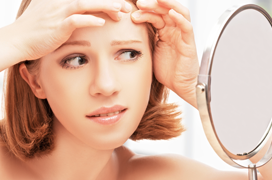Acne
 Acne can be unattractive. It can also cause permanent scarring and emotional distress. Fortunately, several treatment options are available. Patients can often improve mild acne by washing with warm water and a mild soap twice a day and/or using a topical over-the-counter acne medication . For severe cases, laser treatment may be recommended. Results are usually visible as soon as the first session.
Acne can be unattractive. It can also cause permanent scarring and emotional distress. Fortunately, several treatment options are available. Patients can often improve mild acne by washing with warm water and a mild soap twice a day and/or using a topical over-the-counter acne medication . For severe cases, laser treatment may be recommended. Results are usually visible as soon as the first session.
Acne scarring can be treated in a variety of ways including certain skin care products, chemical peels, laser or pulsed light treatments, soft tissue fillers, dermabrasion and microdermabrasion.
What is it?
Acne is the term for pimples and complexion problems that occur in many young people and many adults. Approximately 90% of all people will have acne at some point in their lives. Pimples usually occur on the face, but may extend to the neck, chest, upper arms, back and legs. Acne is a skin problem and does not affect your general health.
What causes it?
Acne usually begins at puberty and may continue for many years. Teenagers get acne as the body matures and produces hormones that stimulate the sebaceous (oil producing) skin glands to make more sebum, or oil. Sebum lubricates the skin. Sebaceous glands within the hair follicles, or pores, become plugged when oil secretion occurs faster than the oil and skin cells can exit the pores. Sometimes the plug causes the wall of the pore to rupture causing redness, swelling, and pus - in other words a pimple. Plugged oil glands may form blackheads and whiteheads. Blackheads are not caused by dirt; rather there is a bacteria that normally lives on the skin and thrives on the sebum produced by oil glands. Sometimes, this bacteria multiplies and causes inflammation and acne.
Acne Facts
Some facts about acne:
- Acne is built into your genes; it runs in families
- In women, acne frequently worsens at the time of menstruation
- Your cosmetics should be labeled "oil-free," or "noncomedogenic"
- Adult women often have trouble with acne through middle age. The reason is unknown although hormones play some role
What can be done?
Acne cannot be completely prevented. Although, a careful skin care regimen can help to lessen it's severity and the formation of new pimples.
Helpful tips:
- Wash your face twice daily with a gentle skin cleanser to prevent oil build-up.
- Do not scrub your face with a harsh washcloth or sponge. Scrubbing may actually make it worse by irritating the skin. Try gentle cleansing with your hands.
- Topical astringents can be used to remove excess oil after cleansing.
- Don't squeeze, scratch, or pick the lesions. This can leave tiny, permanent scars on your face.
There are several over-the-counter treatments that can help improve acne, such as salicylic acid, sulfur, and benzoyl peroxide. They are available in washes, creams and gels. Prescription treatment is recommended if you do not see improvement after one to two months. Topical treatments include antibiotics, benzoyl peroxides, and vitamin A derivatives. Topical medications are sometimes used in combination with antibiotics for optimal results. A variety of lasers and light sources are available to be used in conjunction with medications.
Accutane, an oral vitamin A derivative, is a strong, effective acne treatment which effectively clears signs of acne in many people. There are numerous side effects to Accutane therapy and proper counseling and monitoring is essential.




